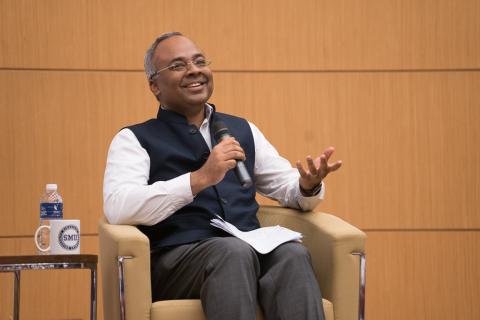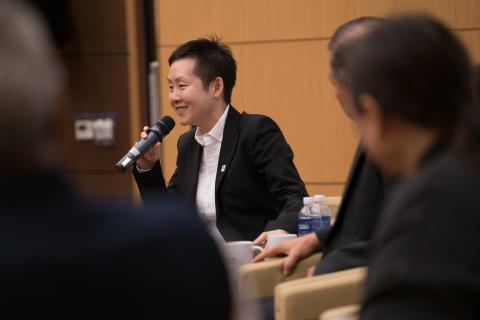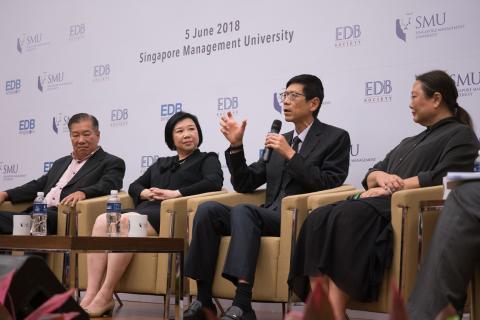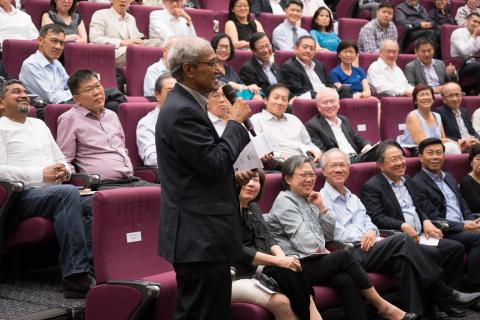![[Featured photo: (from left) Panelists at the Enterprise & Entrepreneur Series were Ms Janice Chia, Founder & Managing Director, Ageing Asia Pte Ltd, Singapore; Mr Ong Chu Poh, Founder, Executive Chairman, and CEO of ECON Healthcare Group; Ms Ivy Lai, Country Manager Philips Singapore and CFO Philips ASEAN Pacific; Prof Tan Chorh Chuan, Chief Health Scientist and Executive Director of the new Office for Healthcare Transformation, Ministry of Health; Mary Ann Tsao, Chairman and Founding Director of the Tsao Foundation; and moderator Professor Gerard George, Dean of SMU’s Lee Kong Chian School of Business, and Professor of Innovation and Entrepreneurship.]](/sites/news.smu.edu.sg/files/styles/max_325x325/public/smu/news/1_18.jpg?itok=Qw8PD1pP)
The fourth of a six-part Enterprise & Entrepreneur Series – Transforming Industries • Creating Value took place on 5 June 2018 (Tuesday) at the Singapore Management University’s Mochtar Riady Auditorium. Co-organised by The EDB Society and SMU, the forum tackled the topics of balancing longer life expectancies with quality of living.
Singapore and cities across the globe are witnessing the demographic trend of a rapidly ageing population. Within this context, there is a growing need to transform healthcare systems to keep up with this demographic trend, and to address the macroeconomic implications of ageing for the government, society and businesses.
In his welcome remarks, Mr Lee Suan Hiang, President of The EDB Society commented that the prospect of ageing is typically regarded by many with fear or dread. He did not believe that was necessary. He quipped, “Age does not matter, as long as what matters does not age. In fact, there is business that can be made in the area of ageing.”
Professor Gerard George, Dean of SMU’s Lee Kong Chian School of Business, and Professor of Innovation and Entrepreneurship, and moderator of the panel discussion, highlighted with numbers how developed nations such as Singapore could expect a doubling of its elderly population over the next decades. Within this context, he encouraged all to refrain from considering merely the underside of ageing, to reframe its negative connotations and to focus on harnessing the potential business opportunities and innovative models that longevity presented.

The panel speakers for the evening were Ms Janice Chia, Founder & Managing Director, Ageing Asia Pte Ltd, Singapore; Ms Ivy Lai, Country Manager Philips Singapore and CFO Philips ASEAN Pacific; Mr Ong Chu Poh, Founder, Executive Chairman, and CEO of ECON Healthcare Group; Prof Tan Chorh Chuan, Chief Health Scientist and Executive Director of the new Office for Healthcare Transformation, Ministry of Health; and Mary Ann Tsao, Chairman and Founding Director of the Tsao Foundation.
Ms Chia, who has been actively involved in consulting organisations seeking global best practices in housing, health and care models that can be translated for the Asian market, shared her take on how to understand the shorthand of ageing. Having accumulated extensive experience through visits to more than 300 residential and aged care homes from over 15 countries, Ms Chia had established Ageing Asia, the region’s first ageing market consultancy social enterprise.
“In the future, it’s an age of enablement. Policies and businesses should look at enablement,” she said. Galvanised by a mission to drive innovation in the way future generations age, Ms Chia believed this could achieved by engaging the business community to create better products and services that will enable healthy ageing, independent ageing and dignified ageing.

Mr Ong introduced himself by sharing his personal struggles of making ends meet when he first started out as an entrepreneur. Motivated not only by filial piety but by a personal belief that more could be done to improve the quality, environment and care for the elderly, he had made the decision to leave a well-paying job in a multinational corporation and to strike out on his own as an entrepreneur.
“I just had a passion to serve our seniors. I felt very strongly that they deserved better,” said
Mr Ong. Having volunteered at old folk’s homes in his youth, he could recall feeling appalled by the poor quality of care afforded to the elderly. In 1987, he set up the first bedded nursing home and in the years that followed, successfully moved the needle on the state of professional management within the home nursing industry.
Today, ECON is one of the largest providers of nursing home care in Singapore. The company runs nursing homes in Malaysia and a retirement village in China as well. Besides operating nursing homes, the ECON Healthcare Group serves as a one-stop integrated healthcare service provider for seniors, caregivers, their families and the community.
“Ageing is… a state of mind. I strongly urge government to support local businesses in the healthcare space, to help them to grow beyond Singapore and in the region,” Mr Ong said. He added that to ensure sufficient manpower and to enhance the standard of care delivered, education institutions could help local citizens to rethink careers such that they would be willing to pursue a professional path within the nursing home industry.
Ms Ivy Lai illustrated how Philips Electronics was actively using technology to help the elderly become more mobile and independent. She illustrated the exciting possibilities with the example of how adaptive intelligence was presently combining the power of artificial intelligence, with the technical and contextual intelligence of humans used to analyse data. Clinicians could now make sense of the data collected, to better diagnose and even personalise treatment plans for patients.
“With big data analytics, medical devices can not only detect when a patient had fallen down but can predict the likelihood of when the patient may next fall again,” said Ms Lai. With the harnessing of such smart technologies and predictive analytics, Ms Lai commented that it was possible to see a reduction in healthcare bills and insurance payouts. “Today, we are not incentivised for taking better care of our health. There should be a shift to incentivise everyone towards healthy living. To live longer and well, it all starts with prevention.”

Prof Tan, who concurrently holds the appointment of Chairman of the Board of the National University Health System, shared the vision of the new Office for Healthcare Transformation. With an average Singapore citizen’s life expectancy being one of the highest in the world, the challenge lay in how to increase the healthy lifespan of an individual. This could be done by preventive measures to counter ill health or the onset of chronic diseases. For example, to reduce the risks of dementia, it had been proven that exercise, maintaining a curious mindset, maintaining good social relationships, avoiding head injuries and good control of risk factors such as high blood pressure.
Prof Tan highlighted that a shift towards a more holistic primary care system was necessary. Given Singapore’s current spending on healthcare stood at 4.5 per cent of GDP, Prof Tan suggested expanding the role of insurance in risk-pooling to manage rising healthcare costs. Continuing to derive more value from the nation’s healthcare system, improving outcomes and reducing costs could help to address the growing demand and rising complexity in Singapore’s healthcare needs.
Dr Tsao commented how existing data showed that it was entirely possible for a large population to live well, or to live disability-free, with the right healthcare system and societal shift in attitudes in place. Dr Tsao, who has worked with numerous multilateral agencies, such as WHO Geneva office’s Ageing and Life Course unit, talked about the Tsao Foundation’s vision of an inclusive society for all ages that optimises opportunities in longevity.
Tsao Foundation, a Singapore-based, regionally oriented non-profit operational foundation dedicated to aged care and ageing issues, aims to address issues of population ageing, promote successful ageing and enhance wellbeing of older people at policy and practice levels by catalysing constructive change.
Stressing the importance of planning early for retirement, to ensure sound and viable financial planning, Dr Tsao said many were looking at the numbers and rethinking the age at which they could retire. She also commented on the importance of strong social networks and family in sustaining through the storms of old age. Of note, research had shown how strong social relationships were positively correlated to emotional well-being, mental resilience, living longer and staying healthy.
Rounding off the panel discussion, Prof George commented, “There were several interesting points in the discussion; how technology can serve as an opportunity to enable the elderly, the shifting of healthcare delivery models and encouraging the younger generation to think of occupations in the healthcare industry.”
More than 200 guests comprising business leaders, entrepreneurs, government officials, EDB alumni as well as SMU faculty, staff and students attended the forum.

About the Enterprise & Entrepreneur Series
The Enterprise & Entrepreneur Series aims to draw insights from inspiring entrepreneurs and industry leaders, explore how Singapore can exploit new opportunities leveraging on megatrends and growth themes, as well as to create a platform for sharing, learning and networking among business trailblazers with aspiring young entrepreneurs. The Series was launched on 31 January 2018 by Mr Heng Swee Keat, Minister for Finance. This initiative is supported by the Economic Development Board (EDB).
The next instalment of the Enterprise & Entrepreneur Series takes place on 21 August 2018 at SMU and will discuss the themes of food and agritech.